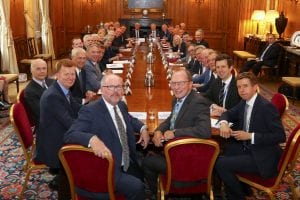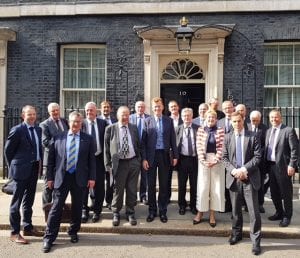
The Prime Minister met with the leaders of England’s Local Enterprise Partnerships (LEPs) today to celebrate their achievements to date and to map out key areas for cooperation under the UK’s Modern Industrial Strategy.
The 19th June marks the first meeting of the Prime Minister’s Council of LEP Chairs, made up of business leaders representing the 38 Partnerships, including Christian Brodie, Chairman of the South East LEP. The
LEPS delivering the Modern Industrial Strategy
Talks focussed on where LEPs carry maximum impact: delivering the objectives of the Modern Industrial Strategy in local areas, and investing in the skills people and businesses need.
Prime Minister Theresa May

Welcoming the Council of LEP Chairs, Prime Minister Theresa May said:
“Local Enterprise Partnerships play a vital role in supporting businesses and innovation across England. From the New Anglia aviation academy – the first of its kind in the UK – to Enterprise M3’s 5G innovation centre, LEPs are developing skills, delivering infrastructure, and securing investment.
“That’s why our Modern Industrial Strategy is clear that they must continue to play a crucial role in our plans to deliver further growth in local economies.
“Today’s first meeting of the Council marks a milestone in this partnership. By working even more closely together, we will continue to maximise our efforts in creating jobs, growth and investment right across the country, delivering long-term, meaningful results for local communities.”
Christian Brodie added: “The meeting clearly demonstrates the government’s commitment to working with local businesses to help build economically strong and sustainable communities.
“What all LEP Chairs share is a burning ambition to drive forward the economies of the communities we represent by working seamlessly with our partners in national and local government, business and further and higher education.”
Co-chair of the first meeting and LEP Chair for Greater Manchester, Mike Blackburn OBE, said: “Today was a golden opportunity for business leaders to sit down with the Prime Minister and identify the key action areas LEPs can help government with, and highlight current achievements.
“The government’s commitment to ‘place’ based development and growth plays to the core strengths of all LEPs, and our local strategies will exploit those strengths of locality and geography.
“This is part of an ongoing dialogue between LEPs and government as we help build an ambitious programme for long-term economic growth. Our strong partnerships of private and public sector leaders and track record of delivery, mean we have an exciting opportunity to help the government build an economy that works for everyone, no matter where they live.”
At today’s meeting, LEPs reinforced their commitment to help deliver a national Industrial Strategy, using their strengths and expertise to lead local strategies for economic growth and partner more effectively with local government.
Recent successes include the Fuller Working Lives strategy in the North East which is helping businesses maximise the skill sets of the 50+ workforce, and the Growing People Programme in the South East Midlands which is building a talent pipeline to support and develop the skills our modern economy will require in the future.
From fostering partnerships between businesses and institutions to enable vital research, to spearheading cutting-edge initiatives at the local level in clean growth and supporting major areas of expansion such as the medical technologies sector, LEPs are playing a crucial role in the delivery of the modern Industrial Strategy, ensuring that the UK remains at the forefront of innovation.
The Council of Local Enterprise Partnership Chairs was announced in the Industrial Strategy White Paper as a new forum for LEP business leaders to help shape national policy decisions and ensure closer cooperation with the Government on Industrial Strategy objectives.